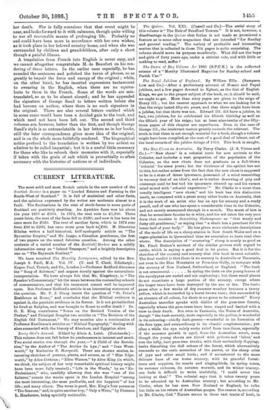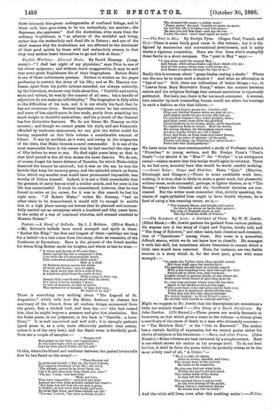The New Chum in Australia. By Percy Clarke. (J. S.
Virtue and Co-)—" New chum' is a colonial term for new arrivals to the Colonies, and includes a vast proportion of the population of the Colonies, as the new chum does not graduate as a full-blown ' colonial ' for some years; but the virulence of the epithet lies not in this, but rather arises from the fact that the new chum is supposed to be in a state of dense ignorance, possessed of a mind resembling in vacancy that of an idiot's, and so is rather deserving of pity and contempt until he has had his ignorance cleared up and his vacant mind stored with colonial experience." Mr. Clarke is a more than usually intelligent "new chum," and his book has this distinctive merit, as compared with a great many other books on Australia, that it is the work of an artist who has an eye for scenery and a ready pencil, and of one who has spent a considerable time in the Colonies, and not merely scampered through in a month. The worst of him is that he sometimes fancies he is witty, and his wit takes the very poor form that consists in describing Shakespeare as 'that musty and fusty old gentleman," or saying that "a shark has a penchant for the lower half of your body." He has given more elaborate descriptions of the mode'of life on a sheep-station in New South Wales and on a sugar-plantation in Queensland than we remember to have read else- where. The description of " mustering " sheep is nearly as good as Mr. Finch Hatton's account of the similar process with regard to cattle, which is saying a good deal in its praise. But it is for the sketches of the country and scenery that this book is most valuable. The final verdict is that there is no scenery in Australia or Tasmania, not even in the Blue Mountains or Fern-tree Gully, to compare with the scenery of New Zealand, Switzerland, or England. "The bash is not ornamental In spring the tints on the young leaves of the eucalyptus are varied and not unpleasing ; but these small plants do not constitute a large portion of the scenery, except where the larger trees have been destroyed by the axe or lire. The bush- grass after a few weeks of dry summer weather becomes a tawny yellow, which is succeeded by a burnt brown tone ; this succeeded by an absence of all colour, for there is no grass to bo coloured." Every Australian traveller speaks with dislike of the gum-tree forests, especially where the gam-trees have been ringed and barked with a view to their death. But even in Tasmania, the Wales of Australia, though "the bush-scenery, more especially in the gullies, is wonderful in its colouring—chiefly dark-greens—wonderful in its formation of tbe fern type, and extraordinary in its chaotic conglomeration ; yet after a while the eye vainly seeks relief from tree-ferns, especially if the summer growth is aged, from the Australian scrub, even though the young shoots are tinted with yellows and lakes,' and rom the lofty, bare gam-tree trunks, with their melancholy flapping; barks disturbing the dull echoes of the forest, which alternatively resounds to the eerie screeches of the parrot, or the sharp cries of jays and other small birds ; and if accustomed to tho more delicate hues of our home scenery, with its graceful forest- trees and coppices, its meads and singing-birds, its spring tones, its summer richness, its autumn warmth, and its winter tracery, one finds it difficult to write truthfully, '1 ooald never tire looking at that.'" The colonial says that it takes twenty years to be educated up to Australian scenery ; but according to Mr. Clarke, when he has seen New Zealand or England, he talks but little on his return of Australian gorges. The reason is, according to Mr. Clarke, that "Nature seems in these vast tracts of bush, in
these intensely blue-green undergrowths of confused foliage, and in these cold, bare gum-trees, to be too melancholy, too sombre ; she depresses, she oppresses." And the Australian, even more than the ordinary Englishman, is "an admirer of the mirthful and living, rather than the melancholy and dead life in Nature ; and one of the chief reasons why the Australians are not affected to the detrimeat of their good spirits by these wild and melancholy scenes, is that they very seldom bestir themselves to go and look at them."





































 Previous page
Previous page